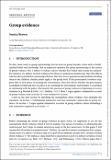Files in this item
Group evidence
Item metadata
| dc.contributor.author | Brown, Jessica Anne | |
| dc.date.accessioned | 2022-10-18T09:30:01Z | |
| dc.date.available | 2022-10-18T09:30:01Z | |
| dc.date.issued | 2022-10 | |
| dc.identifier | 279710840 | |
| dc.identifier | 87bbc4e9-f4f4-438a-b4ea-e654abc4c6ce | |
| dc.identifier | 000868829800001 | |
| dc.identifier | 85139837635 | |
| dc.identifier.citation | Brown , J A 2022 , ' Group evidence ' , Philosophical Issues , vol. 32 , no. 1 , 12220 , pp. 164-179 . https://doi.org/10.1111/phis.12220 | en |
| dc.identifier.issn | 1533-6077 | |
| dc.identifier.other | ORCID: /0000-0002-1149-4814/work/121312437 | |
| dc.identifier.uri | https://hdl.handle.net/10023/26210 | |
| dc.description | Funding: Leverhulme Trust (Grant Number(s): MRF-2020-035). | en |
| dc.description.abstract | To date, most work in group epistemology has focused on group doxastic states such as belief, justified belief and knowledge. But an important question for group epistemology is the nature of group evidence. For, a subject's evidence affects whether her beliefs and actions are justified. For instance, if a subject receives evidence that these are poisonous mushrooms, then that affects whether she is justified in continuing to believe that they are not poisonous and justified in feeding them to her children. Similar points apply at the group level. If the government's evidence supports that its new policy is harming the environment, then that affects whether the government is justified in believing that its policy is not harming the environment and whether it is justified in continuing with the policy. Fortunately, the question of group evidence is beginning to receive attention (e.g. Buchak & Pettit, 2015; Hedden, 20192). Here, I argue against a summative account of group evidence and in favour of a non-summative account. I start in the next section by sketching the assumptions about evidence that underpin the argument. In section 3, I distinguish summative and non-summative approaches to group evidence. In section 4, I argue against summative accounts of group evidence before defending a non-summative approach in sections 5–6, 5–6. | |
| dc.format.extent | 270562 | |
| dc.language.iso | eng | |
| dc.relation.ispartof | Philosophical Issues | en |
| dc.subject | B Philosophy (General) | en |
| dc.subject | T-NDAS | en |
| dc.subject.lcc | B1 | en |
| dc.title | Group evidence | en |
| dc.type | Journal article | en |
| dc.contributor.sponsor | The Leverhulme Trust | en |
| dc.contributor.institution | University of St Andrews. Philosophy | en |
| dc.identifier.doi | https://doi.org/10.1111/phis.12220 | |
| dc.description.status | Peer reviewed | en |
| dc.identifier.grantnumber | en |
This item appears in the following Collection(s)
Items in the St Andrews Research Repository are protected by copyright, with all rights reserved, unless otherwise indicated.

